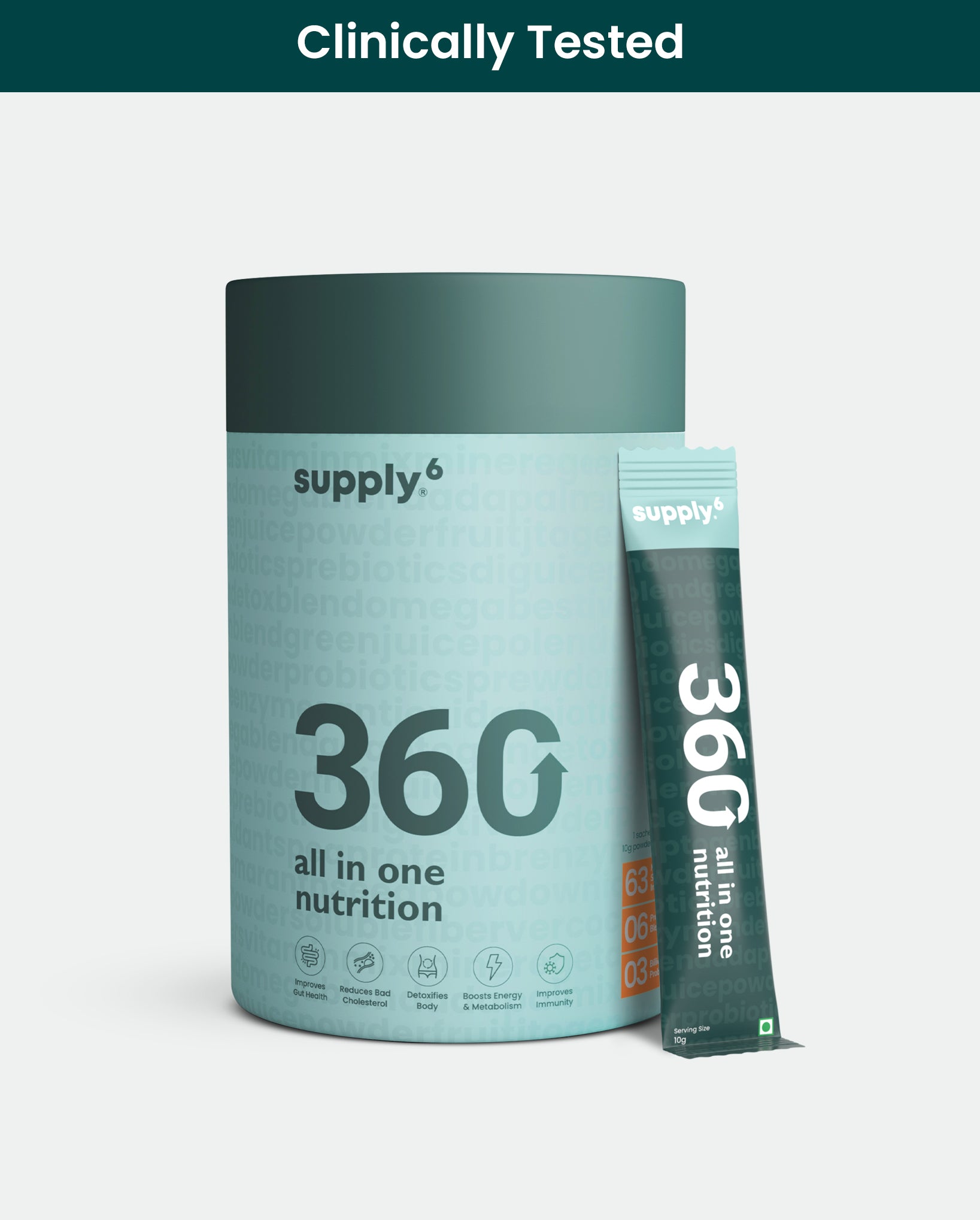Vitamin B5 Deficiency
Have you ever heard of Vitamin B5? Also known as pantothenic acid, this crucial nutrient supports our body's energy metabolism and overall health. It converts the food you eat into energy and helps in the production of red blood cells. With such an important role, you would think people would be more mindful of vitamin B5 deficiency.
However, despite its importance, deficiency in Vitamin B5 is often overlooked. Just like every other vitamin and nutrient, we must adhere to practices that include them in our daily lifestyle. Many people don’t realize they might be lacking this vital vitamin, which can lead to a range of vitamin B5 deficiency diseases.
This blog will guide you through understanding vitamin B5 deficiency by exploring its causes, symptoms, associated conditions, and treatment options, providing valuable information to ensure your dietary needs are met.
Understanding Vitamin B5 Deficiency Diseases
Vitamin B5 is a powerhouse nutrient that your body needs to function properly. Vitamin B5 helps in the formation of coenzyme A, a compound that helps in the synthesis of fatty acids and the metabolism of carbohydrates and proteins. Hence it’s essential for our overall health.
-
It's essential for converting carbohydrates, proteins, and fats into energy. This in turn helps to keep our metabolism in check and energy levels stable.
-
This vitamin is also vital for producing hormones and maintaining healthy skin. Vitamin B5 ensures healthy skin, hair, and eyes, and helps in the adequate function of our nervous and digestive systems.
The good news is that vitamin B5 deficiency is quite uncommon. This is because you can find it in a host of foods like vegetables, meats, whole grains, eggs, and dairy products.
While a deficiency in Vitamin B5 is rare, it can occur under certain circumstances. For instance, individuals suffering from malnutrition may not get enough of this vital nutrient. In some cases, genetic mutations can affect how your body absorbs and utilizes Vitamin B5.
To prevent such deficiencies, consider adding Supply6 360 to your meals. This drink covers all the essential nutrients your body needs and helps prevent a variety of health issues from bone health to gut problems. Covering 84% of your daily recommended intake, this drink works wonders for your overall health!
Recognizing what causes of Vitamin B5 deficiency is important. It helps you determine if you’re lacking this essential nutrient and take measures to prevent vitamin B5 deficiency diseases in the long run.
What Causes Vitamin B5 Deficiency?
Vitamin B5 deficiency diseases are often rare in developed nations, but they can occur in certain situations. Let’s look at some primary causes.
1. Severe Malnutrition
One of the primary causes of Vitamin B5 deficiency is severe malnutrition. When your diet lacks essential nutrients, you may miss out on Vitamin B5 along with other vitamin deficiencies.
2. Genetic Mutations
In some cases, genetic mutations can affect how your body synthesizes pantothenic acid. These mutations can impair how your body absorbs and utilizes Vitamin B5. It can lead to a deficiency even if you consume adequate amounts through your diet.
3. Chronic Conditions and Lifestyle Factors
Several lifestyle and health factors can contribute to vitamin B5 deficiency diseases.
-
Chronic stress can drain your body’s resources and make it harder to absorb and use nutrients effectively.
-
Similarly, excessive alcohol consumption can interfere with nutrient absorption and metabolism.
-
Kidney disease is another factor; it can affect how well your body manages and utilizes nutrients, including Vitamin B5.
-
Conditions like Crohn's disease and Celiac disease can hinder nutrient absorption, increasing the risk of a deficiency.
-
Heavily processed foods can lead to reduced vitamin B5 intake. Processing methods such as excessive heating, canning, and refining often strip foods of their nutrient content.
By understanding these causes, you can better manage and prevent potential deficiencies, either by altering dietary habits or consulting healthcare professionals for tailored guidance.
If you want more information, check out this video that provides a comprehensive overview of Vitamin B5, including its functions, symptoms of deficiency, causes, and how it can be linked to certain diseases.
Vitamin B5 deficiency can sneak up on you. It’s important that you recognize the signs early on to maintain your health and prevent vitamin B5 deficiency diseases.
Symptoms of Vitamin B5 Deficiency
Although it’s rare, being aware of the symptoms can help you take action before things get serious. Let’s explore the common symptoms associated with this deficiency.
Fatigue, Weakness, and Sleep Disturbances
One of the first signs you might notice is a feeling of fatigue or weakness. Sleep disturbances, such as trouble falling asleep or staying asleep, can also occur. You may end up feeling more tired than usual, even after a full night’s sleep.
Gastrointestinal Issues
Digestive problems can be another indicator. You might experience gastrointestinal issues like stomach cramps, diarrhea, or a general feeling of discomfort in your gut. Nausea, vomiting, and abdominal cramps are common gastrointestinal symptoms.
Feeling digestive issues? Take a look at these Simple Foods and Ways to Help Your Digestion Naturally.
Numbness and Tingling
As the deficiency progresses, you may start to notice numbness or tingling in your hands and feet. This is often a sign that your nerves are not functioning as they should. If you experience these sensations regularly, it’s essential to pay attention and consider your nutrient intake.
Skin Problems
Your skin can also reveal a lot about your health. Healthy skin relies on a balanced diet, and improper amounts of essential nutrients can result in issues such as dryness, irritation, or even acne.
Severe Symptoms
In severe cases, vitamin B5 deficiency can present itself through symptoms such as headaches, muscle cramps, and impaired muscle coordination. Psychological symptoms like irritability, restlessness, and noticeable personality can also manifest. These symptoms can affect your quality of life.
While there are no specific diseases directly caused by a deficiency in vitamin B5, its absence can have a significant impact on your overall well-being. Hence, it’s crucial to learn how this vitamin affects various health conditions.
Potential Health Benefits Linked to Vitamin B5
While vitamin B5 may not directly cause diseases, it has been studied for its potential benefits in treating various conditions.
-
For example, it may help manage symptoms related to rheumatoid arthritis, a chronic inflammatory disorder affecting the joints.
-
Some research suggests that vitamin B5 can reduce inflammation and improve joint health.
-
Additionally, it has been explored for its role in alleviating premenstrual syndrome (PMS) symptoms, providing relief for many women during their menstrual cycles.
Furthermore, certain skin disorders, such as acne and eczema, may benefit from vitamin B5. Its moisturizing properties can help improve skin hydration and reduce inflammation. This Reddit thread shows the personal experience of a user who successfully managed acne using pantothenic acid, or vitamin B5.
While promising, more research is needed to confirm these findings, researchers are actively exploring its potential.
But what to do when you find out you’re deficient in vitamin B5? Many treatment options can help you prevent vitamin B5 deficiency diseases and manage proper intake levels.
Treatment Options for Vitamin B5 Deficiency
When it comes to addressing vitamin B5 deficiency diseases, a well-rounded approach centered on diet is often recommended as the first line of defense.
Eat a Balanced Diet
A balanced diet rich in various foods can provide you with all the essential nutrients your body needs. Foods that are particularly high in this vitamin include:
-
Meats: Chicken, beef, and fish are excellent sources.
-
Vegetables: Broccoli, mushrooms, and avocados offer good amounts of vitamin B5.
-
Eggs: Not only are eggs nutritious, but they also contain pantothenic acid.
-
Legumes: Lentils, chickpeas, and beans are great plant-based sources.
-
Milk: Dairy products, like milk and yogurt, are beneficial sources of vitamin B5.
-
Fortified Cereals: Many breakfast cereals are fortified with essential vitamins, including vitamin B5. When selecting your cereals, check the labels to ensure they contain this important nutrient.
Take Supplements
Supplements can be a viable option for those who find it challenging to meet their vitamin needs through diet alone. These come in various forms, including capsules and tablets. However, it’s essential to remember that supplements should complement a healthy diet, not replace it.
Supply6 Wholesome Meal offers a convenient way for you to include essential nutrients such as vitamin B5 in your daily lifestyle. This guilt-free, vegan drink can fulfill 25% of your daily nutrition requirements.
Consult a Healthcare Professional
Before starting any new supplement regimen, consult a healthcare professional. They can help you determine if you need supplements and recommend the correct dosage.
-
Professionals can make sure the supplements do not interfere with other medications, such as antibiotics or blood thinners.
-
A healthcare professional can also assess your situation and check for any underlying health concerns that might be affecting your nutrient levels.
Early detection is key to managing any deficiency. Your doctor can recommend dietary changes, tests to check nutrient levels, or further investigations if necessary.
It’s important to always consult a professional for health-related issues. Plus, routine blood tests to check your nutrient levels can help you catch deficiencies early on.
The most effective way to prevent vitamin B5 deficiency diseases is through a balanced diet rich in various foods. Prioritize whole foods over processed ones and prepare meals with fresh ingredients for a full and healthy lifestyle.
Final Thoughts
While vitamin B5 deficiency diseases are rare, they can occur, especially in individuals with inadequate diets or certain health conditions. So, be aware of the signs and symptoms of deficiency.
The first step toward prevention and treatment is recognizing the importance of vitamin B5. Remember, your health is an investment. By prioritizing your nutrition and being informed about essential vitamins like B5, you are setting the stage for a healthier future.
If you're struggling to get enough nutrients through food alone, consider trying Supply6 products. Designed for busy lifestyles, these drinks offer a balanced blend of essential nutrients, making it easier for you to maintain your health even on the go. Start your journey toward better health with Supply6.
Take charge of your health today! Explore our selection of meal replacement drinks at Supply6 and discover how simple it can be to support your nutritional needs.


